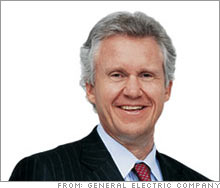How to get a great reputationWhat gives GE such a glow? Fresh ideas and being green distinguish the winners in our 25th annual rankings.(Fortune Magazine) -- Compared to, say, the 13 billion years that have elapsed since the Big Bang sent the universe spinning outward into space, the last quarter-century is nothing. But here on Earth in the Internet Age, it might as well be a geological era for all the upheaval it has brought. Consider: In 1982, the year of the first Fortune survey of corporate reputations, green was just the color of money. These days "green" means something more. The three Most Admired Companies this year - General Electric (Charts), Starbucks (Charts), and Toyota (Charts) - are building their growth at least partly on strategies and products aimed at helping preserve the planet. Eco-friendliness was hardly a priority in 1982. President Reagan was struggling in his second year in the White House, the Berlin Wall still stood, and a recession had pushed unemployment to double-digit levels. The old behemoth AT&T, No. 6 among the Most Admired Companies back then, was still what people meant when they said "the phone company." Bill Gates and Paul Allen had founded Microsoft in 1975, but its IPO wouldn't happen for four more years. Google's founders were still in grade school. What America's Most Admired Companies had in common back then was mostly their sheer size. IBM was No. 1. Only two companies on that first list - General Electric and Johnson & Johnson (Charts) - appear in the current top ten. This year GE takes the top spot overall for the seventh time in a decade. Last year we expanded our overall Most Admired list from ten companies to 20, and that throws yet more light on some changing reputations. IBM (Charts), No. 19 in the 2006 survey, has dropped off the overall list despite ranking No. 1 in its own industry, nudged aside by the ascendancy of such high-profile retailers as Costco, Nordstrom, and Target. The handful of companies that have consistently won the applause of their peers over this quarter-century have adapted to the changing environment in ways that Darwin never dreamed of, and they plan to keep it up. As even the Bush administration reluctantly acknowledges that hydrocarbon emissions may be imperiling the planet, many of the Most Admired Companies are busy figuring out ways to think green and garner more greenbacks too. United Parcel Service (No. 16) has a fleet of about 1,550 alternative-fuel delivery trucks, including 50 new-generation hybrid-electric vehicles that will cut fuel consumption by 44,000 gallons a year. Goldman Sachs, No. 11 on our list, plans to sink $1 billion into clean-energy investments. Then there's Wal-Mart (Charts). By most measures the company had a rotten year: its first quarterly earnings decline in a decade, a skittish stock price, and a string of PR disasters (including a marketing chief who allegedly had an affair with a subordinate). Wal-Mart was No. 1 among the Most Admired Companies in our 2003 and 2004 rankings, then fell to No. 12 in the 2006 survey. Yet voters in our poll haven't counted the company out. It hangs on in the top 20 this year, at No. 19, which may be thanks in some measure to its new green strategy that includes everything from cutting back on packaging to pushing more energy-efficient light bulbs. It's no coincidence that the top three companies on the list are among the most vocal about how green they are. Starbucks gets extra points for jumping on the bandwagon long ago. For years now the company has paid fair-market prices to Third World coffee farmers and helped develop ecologically sound growing practices. Starbucks is also a regular on Fortune's annual list of the 100 Best Companies to Work For. It's green, it's humane, it's politically correct, it sells a popular product and provides a comfy place to hang out and consume same - what's not to like? Certainly investors have no complaints: If you had put $1,000 into Starbucks stock when the company went public in 1992, you'd have been $52,718.10 to the good at year-end 2006, vs. just $3,515.30 for Standard & Poor's 500. There may be a natural limit to the number of people willing to plunk down five bucks for a cup of coffee, but if so, Starbucks hasn't hit it yet. That hasn't stopped the visionary Schultz from worrying about his company losing its special chemistry. In an internal memo that surfaced in February, he warned executives about a "watering down of the Starbucks experience" and a "commoditization of our brand." Another Most Admired company, JetBlue Airlines, which in our survey ranks No. 3 in its industry, is going through more pressing concerns about its image after an episode in which passengers were kept aboard planes on the ground for several hours during a snowstorm. JetBlue chief David Neeleman, calling himself "mortified" and "humiliated" by the PR debacle, led the company to introduce a Customer Bill of Rights, including payments for some delays, that may help the airline recoup its reputation for good service. |
Sponsors
|


